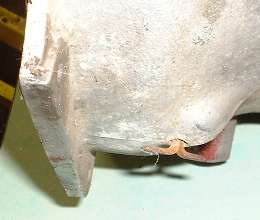The MGA With An Attitude
COTTER PIN, The Engineered Leak Point -- OF-109
At 08:06 AM 10/31/05 -0700, Bill Robinson wrote:
"It appears a little bit of oil is leaking from the bell housing. Could this be from the tranny of which I did nothing to, or my main seal which needs breaking in?"
You are dealing with a 1950's vintage car which was built with 1920's technology. Do not expect a perfect seal or a drip free garage floor.
MGA does not have a rubber main seal, but uses a mechanical scroll to auger oil back into the engine as it runs. If should not leak while it is running, but it may dribble a few drops each time after engine shut down It's just the nature of the beast. If in a past life the main bearings were badly worn, to the point of having an audible knock, then the scroll seal parts may have come into mechanical contact while running, and it might leak a little more, possibly even a few drips at low idle speed. Oil is cheap, so we generally learn to live with such things.
If in a past life it may have incurred a broken crankshaft (definitely not unheard of) then all bets are off, and the scroll seal parts could be damaged so badly that it would dribble almost continuously at idle. That's when you get really ticked off and try to do something about it, like fabricate and install a rubber rear seal. We hope that very few ever get that bad. The proper fix for a damaged scroll seal is to shave the main bearing caps down about .010", then line bore the main bearing cradles about .005" higher in the block to regain original bore size for the scroll seal female parts. The crankshaft is usually not a problem, because such severe damage is usually caused by a broken crankshaft, in which case it went in the trash and was replaced.
 While fiddling about with the gearbox you may have noticed a curious little cotter pin rattling about loosely in a hole in the bottom of the bellhousing. That is by no accident a genuine factory engineered leak point, designed to never get plugged up. Engine vibration makes the cotter pin rattle about to keep the hole clear so any oil which may (will) get into the bellhousing has a way to drain out.
While fiddling about with the gearbox you may have noticed a curious little cotter pin rattling about loosely in a hole in the bottom of the bellhousing. That is by no accident a genuine factory engineered leak point, designed to never get plugged up. Engine vibration makes the cotter pin rattle about to keep the hole clear so any oil which may (will) get into the bellhousing has a way to drain out.
Now, did you really want to buy a 1950's vintage car?
On the other hand, if it looks like the Exxon Valdes stopped in your garage, you may have an actual problem.
|